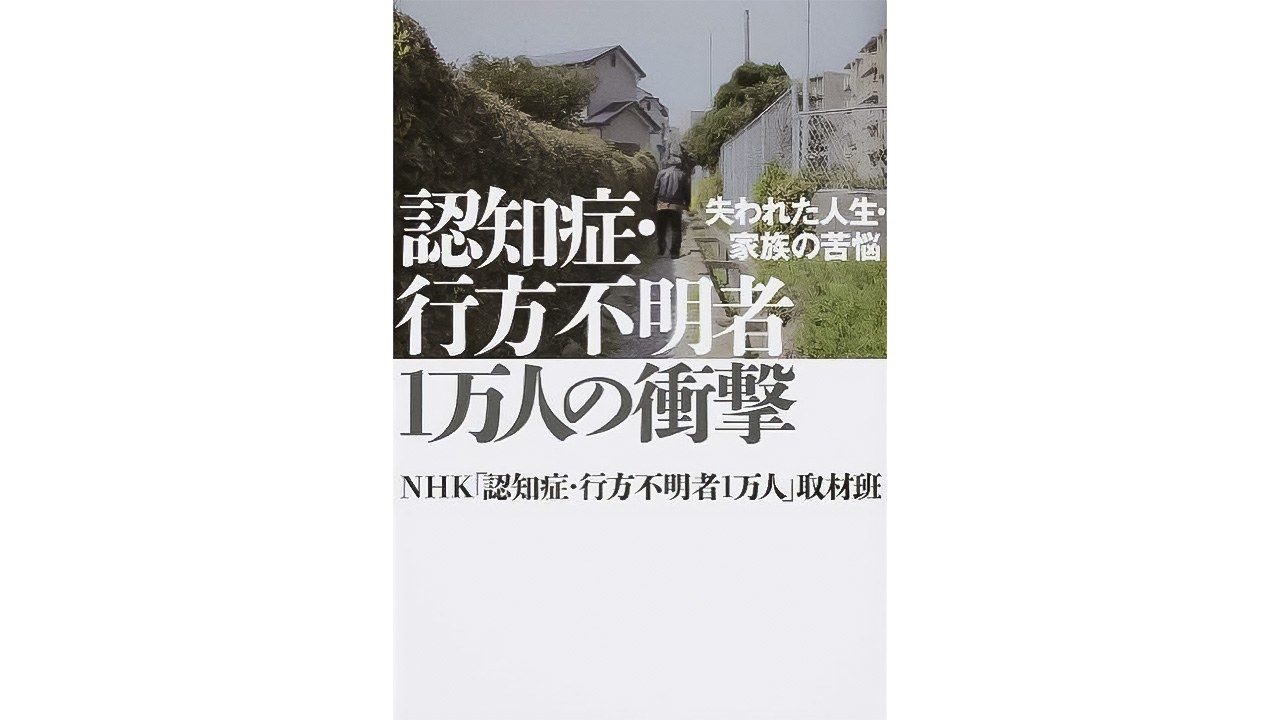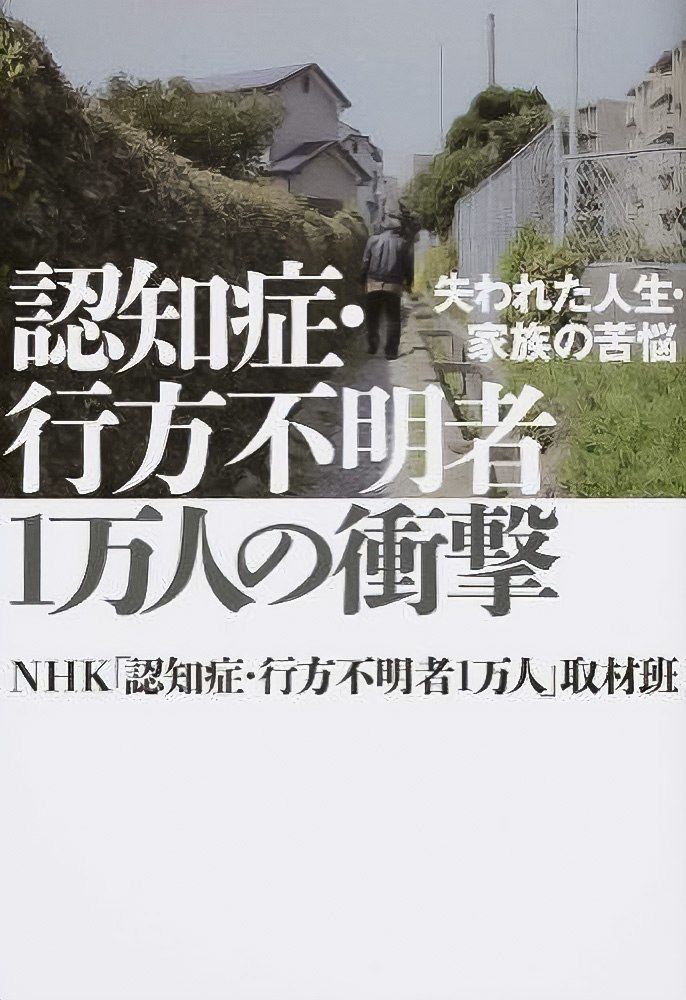
The Missing Masses: Book Explores Exploding Numbers of Lost People with Dementia
Books Family Health Society- English
- 日本語
- 简体字
- 繁體字
- Français
- Español
- العربية
- Русский
Imagine sitting at home, enjoying dinner with your elderly father. Now imagine that he wanders out the front door the next morning and vanishes, never to be seen again. He might still be alive, somewhere out there, thinking of his family and wishing he could go back home. But suffering from dementia, he is unable to tell the people around him where he is from, or even his own name. Those seeking to aid him have nothing to go on, as he has left home without any form of identification. In the end, he is given an assumed name and approximate age and placed in a care facility, where he lives out the rest of his lonely days.
For someone like me, whose parents are now approaching advanced age, this is a terrifying scenario to consider. But it is one that many in Japan—indeed, a shockingly high number, according to a 2015 book by a team of NHK journalists—are forced to confront as the nation’s society continues to gray.
Wanting to Know for Sure
An investigation by the National Police Agency determined that some 10,000 dementia sufferers went wandering in 2012 alone, ending up classified as missing. The 2015 book Ninchishō, yukue fumeisha: 1 man nin no shōgeki (Dementia and the Lost: The Shock of 10,000 Gone Missing) was essential in shining light on this previously little-recognized aspect of an aging Japan.
The cases detailed in this book include many where the missing person does manage to return home to his or her family. But there are, sadly, many others where the person is confirmed dead, and still other cases where years pass, and the family of the lost one remains unsure whether he or she is dead or alive.
“Every day he was gone felt like hell to me,” says one woman whose 76-year-old husband left the house while she was occupied with something else for 15 minutes one day, never to return. “All these feelings were tangled up within me—part of me thinking that I’d never see him again, and another part keeping up hope that he would be found. Why did our parting have to come in a form like this?”
This woman’s tale ended in tragedy, when her husband was found dead three weeks later on the grounds of a home just 500 meters away from his own. Investigators determined that he likely froze to death after wandering onto the property and collapsing there.
Another person quoted in the book says, “If our lost one is dead, then we want to know that for sure.” There is deep pain in these words, coming from a family that waits at home, preparing servings for the missing person at every meal, finding it hard to know when to draw a clear line.
The book does recount some brighter outcomes. When the NHK program on which it was based originally aired in May 2014, it led to the reunion of a couple in their seventies who had been parted for seven years after the wife went missing. But others barely survived their ordeal, like the man in his eighties, living on his own, who went missing from his home and was found a week later, curled up and shivering in only his underwear. And the book also tells the story of a son who has been searching for his mother, in her eighties, for more than two years.
One thing all the families left behind share is a deep sense of regret. Why did they take their eyes off of their elderly relative? Why did they hesitate to file a missing person report right away?
Breaking Free from the Meiwaku Curse
How can society reduce the number of dementia sufferers who go missing? This book confronts us with the idea that we must do more than simply rely on the efforts of the families involved.
There has been some progress in the years since the publication of this title. Today information on missing persons with dementia is managed online and shared among all Japan’s prefectures. While measures like this are important, though, it seems to me that we will remain unable to get at the core of the problem until Japanese society itself achieves real change.
The families of dementia sufferers face both mental anguish and physical fatigue. Here, though, these challenges combine with peculiarly Japanese traits like a sense of embarrassment that keeps people from divulging to others that their parent has dementia, or the idea that it is inexcusable to call the police for help each time the person goes missing. The concept that we must avoid causing meiwaku, or trouble for others, is a quintessentially Japanese concept that has become tightly bound up with questions of personal responsibility. Whenever any issue arises in connection with social welfare in Japan, whether it be mass layoffs of dispatch workers during an economic lull or the distribution of welfare benefits to the needy, we are certain to hear voices loudly calling for a stronger focus on “self-responsibility.”
In the years since 2015, when this book came out, the graying of Japan’s population has advanced far faster than anyone expected. This has been accompanied by a climbing number of dementia sufferers, to the point where some predict that in the near future, one in five Japanese will have some degree of dementia. In recent years in particular, the COVID-19 pandemic has kept many elderly cooped up in their homes, producing impacts on their mental well-being.
This is not a brand-new book, but the issues it tackles are far from out of date. Indeed, it is a work that continues to sound warnings we must heed about themes that will only become more vital as time goes on. In 2021, just six years after the figure 10,000 appeared in its title, the number of missing persons with dementia cleared 17,000 in Japan. Thanks to advances in networks letting local governments share information on these cases, there has been a rise in the percentage of these people who are found and brought back home within days. But as the population continues to age, we can expect to see the caseload keep rising.
This will naturally bring about an increase in the number of family members living together with a dementia sufferer. We must find a way to remove worries about meiwaku from their welfare-related concerns, making it easy for them to obtain the support they need without hesitation when the time comes. We cannot demand that the families themselves solve the problems on their own. I hope to see such a new reality arise in Japan.
Ninchishō, yukue fumeisha: 1 man nin no shōgeki (Dementia and the Lost: The Shock of 10,000 Gone Missing)
By an NHK investigative team
Published by Gentōsha in 2015
ISBN: 978-4-344-02777-0
